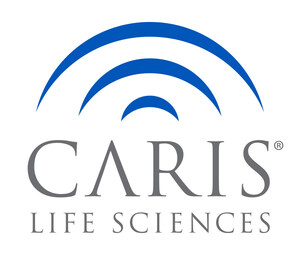Caris Life Sciences Presents New Tumor Profiling Research Providing Insights into the Clinical Benefit of Targeted Therapies for Colorectal Cancer Treatment-Resistant Subgroups
Additional Etiology Research Demonstrates Clinical Utility of Caris Molecular Intelligence in Identifying Molecular Targets for Guiding Treatment Strategies
IRVING, Texas, May 31, 2015 /PRNewswire/ -- Caris Life Sciences®, a leading biotechnology company focused on fulfilling the promise of precision medicine, today announced the results of a study identifying the clinical benefit of targeted therapy in colorectal cancer (CRC) with high microsatellite instability (MSI-H), a predisposition that occurs in 15% of all CRCs causing significantly different prognosis and response to treatment. These data, in addition to other etiology studies in HPV-induced cervical, oropharyngeal and anal carcinomas, bladder cancer and mucosal melanoma are being presented at the 2015 annual meeting of the American Society of Clinical Oncology in Chicago, Ill.
Researchers utilized Caris Molecular Intelligence®, the company's panomic comprehensive tumor profiling service, to investigate therapeutically important biomarkers in 64 MSI-H, 9 low microsatellite instability (MSI-L), and 558 microsatellite stable (MSS) samples. CRC that display a high level of microsatellite instability are due to either hereditary predisposition (Lynch syndrome [LS]) or somatic hypermethylation of MLH1, which cause resistance to standard treatment options.
"Etiology research is particularly important for abnormal subtypes of cancer where the unique molecular characteristics of the tumor can play a critical role in determining the statistical likelihood of treatment benefits," said Zoran Gatalica, M.D., DSc, lead author of the study and Executive Medical Director at Caris Life Sciences. "This study allowed us to identify features common to all MSI-high CRC and specific to somatic acquisition of MSI CRC, which are insights critical to personalizing treatment."
Using Caris Molecular Intelligence (abstract #3597), researchers observed a significantly higher expression of thymidylate synthase (TS), PTEN expression and higher mutation rates of BRAF, CTNNB1, HNF1A, BRCA1 and BRCA2, in MSI-H compared to non-MSI-H tumors. MSI-H cancers were also significantly more often infiltrated with PD-1+ lymphocytes. Features found specific to sporadic MSI-H tumors (defined as MSI-H and BRAF V600E) in comparison with non-MSI-H tumors included higher mutation rates on select genes within the PI3K/AKT/mTOR pathway. Of the MSI-H tumors analyzed, 20 were confirmed Lynch syndrome cases, 100% of which exhibited TS expression. LS cases also observed a higher expression of CTNNB1 and HNF1A mutations. LS cases observed a lower mutation rate of PTEN when compared with sporadic MSI-H tumors.
"The study results show that TS expression is a characteristic of both sporadic MSI-H and Lynch tumors, potentially explaining the observed reduced clinical benefit from fluorouracil (5-FU)," said Wafik S. El-Deiry, M.D., author of the study and Deputy Director at Fox Chase Cancer Center in Philadelphia, Pa. "Higher PD-1 + TIL, BRCA1/2 and CTNNB1 mutations suggest targeted immunotherapy, PARP and WNT pathway inhibitors as more promising treatment options for patients with MSI-H CRC."
In a second etiology study titled "Theranostic biomarkers involved in immunomodulation and the PI3KCA signal transduction pathway in HPV-induced cervical, oropharyngeal, and anal carcinoma" (abstract #11107), researchers used Caris Molecular Intelligence to compare theranostic biomarkers involved in immunomodulation and the PI3KCA signal transduction pathway in cancers caused by human papillomavirus (HPV), including squamous cell carcinomas of cervix (CSCC), anal canal (ASCC) and oropharynx (OSCC). In 201 ASCC tumors, 321 CSC tumors and 358 OSCC tumors, researchers revealed that HPV-induced carcinogenesis yields a more homogeneous phenotype compared to many other solid tumors with genomic instability. These data support previous work identifying the PIK3CA-AKT-mTOR pathway as a potential target and demonstrate the need to explore PD1/PDL1 inhibition in these cancers given the observed phenomenon of HPV E6 & E7-induced oncogene addiction following viral integration.
In a third study titled "Molecular characterization of bladder cancer in smokers versus non-smokers" (abstract #4528), researchers profiled 676 consecutive bladder cancer (BC) samples using Caris Molecular Intelligence to evaluate the correlation between smoking status (smokers vs. non-smokers) and specific genetic alterations in BC. The difference in molecular biology between smokers and non-smokers observed with BC suggest a different oncogenesis with potentially different treatment options. Increased incidence of PIK3CA mutations in non-smokers with BC may inform therapeutic options in this select group of BC patients with no smoking history. The results warrant further verification in a larger group of BC patients in a prospective clinical study.
In a fourth etiology study titled "Multiplatform biomarker analysis of non-sun-exposed mucosal melanoma" (abstract #9042), researchers analyzed 93 non-sun-exposed mucosal melanoma specimens, a rare malignancy that is notoriously resistant to conventional chemotherapy with few treatment options. Utilizing Caris Molecular Intelligence, researchers identified a high rate of PD-1 and PD-L1 co-expression, suggesting that new immunotherapies should be strongly considered in the advanced stages of this disease.
About Caris Life Sciences®
Caris Life Sciences® is a leading biotechnology company focused on fulfilling the promise of precision medicine through quality and innovation. Caris Molecular Intelligence®, the company's healthcare information and comprehensive tumor profiling service with more than 70,000 patients profiled, provides oncologists with the most clinically actionable treatment options available to personalize cancer care today. Using a variety of advanced profiling technologies to assess relevant biological changes in each patient's tumor, Caris Molecular Intelligence connects biomarker data generated from a tumor with biomarker-drug associations supported by evidence in the relevant clinical literature. Since 2009, Caris has tracked clinical and outcome data for certain patients undergoing tumor molecular profiling, for which Caris has observed that patients treated with drugs consistent with their molecular profile show a significant increase in overall survival. The company is developing its Carisome® TOP™ technology, a revolutionary and proprietary blood-based platform for the development of novel therapeutics, drug delivery and drug target identification. The technology is also being developed for diagnosis, prognosis, and theranosis of cancer and other complex diseases. Headquartered in Irving, Texas, Caris Life Sciences offers services throughout Europe, the U.S., Australia and other international markets. To learn more, please visit www.CarisLifeSciences.com.
SOURCE Caris Life Sciences
Related Links
http://www.carislifesciences.com
WANT YOUR COMPANY'S NEWS FEATURED ON PRNEWSWIRE.COM?
Newsrooms &
Influencers
Digital Media
Outlets
Journalists
Opted In






Share this article